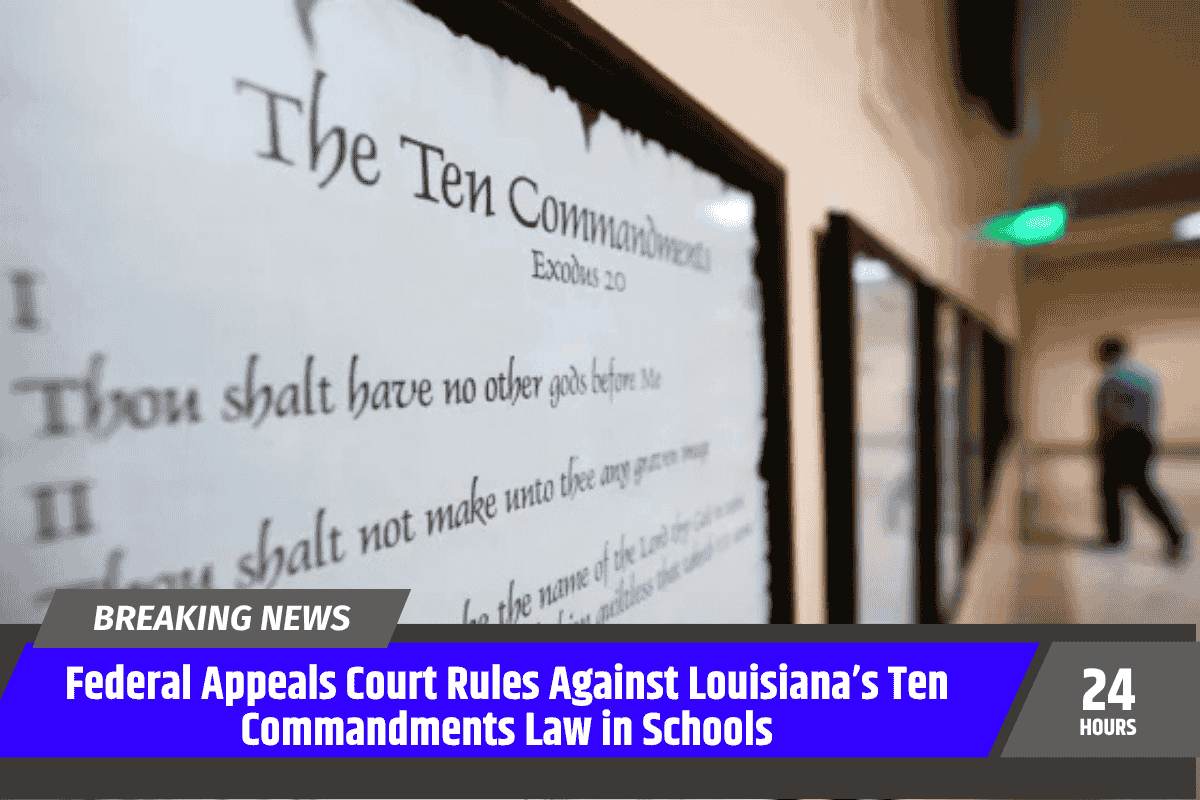A federal appeals court ruled on Friday in favor of a group of parents from Louisiana who had challenged a state law requiring public schools and colleges to display the Ten Commandments in every classroom.
The court upheld a lower court’s decision from November, declaring the law “facially unconstitutional.” This legal battle now moves closer to the U.S. Supreme Court, where it could have far-reaching implications.
What Led to the Lawsuit?
The lawsuit was filed by a coalition of parents from various religious backgrounds, including Jewish, Christian, Unitarian Universalist, and nonreligious groups, who argued that the law violated the separation of church and state.
Louisiana’s law, known as HB71, mandates that public schools and state-funded universities display posters of the Ten Commandments in all classrooms.
The posters must be at least 11 by 14 inches and include a “context statement” explaining the commandments’ historical significance, as claimed by the state.
Louisiana’s Attorney General, Liz Murrill, disagreed with the ruling and announced plans to continue the legal fight. The law was enacted this year, and the state provided guidelines on how the posters should be displayed.
However, while the law applies to most school districts in Louisiana, five districts, where the plaintiffs live, are exempt from complying during the lawsuit process.
Court’s Ruling and Implications
The U.S. Court of Appeals for the Fifth Circuit ruled that the law is unconstitutional, siding with the plaintiffs who argued that it promotes religious beliefs in public schools, which violates the First Amendment’s Establishment Clause.
The court stated that the law’s requirement to display the Ten Commandments in every classroom was “facially unconstitutional.” This ruling blocks the enforcement of the law in the five Louisiana school districts involved in the lawsuit.
The case now has the potential to be brought before the U.S. Supreme Court, where conservative justices hold a 6-3 majority.
If the Supreme Court decides to hear the case, its decision could have significant consequences for the future of religion in public schools across the country.
The State’s Response
Louisiana’s Attorney General Liz Murrill has expressed strong opposition to the ruling. She argued that the law does not violate the Constitution because it allows for the Ten Commandments to be displayed for historical and educational purposes, not religious promotion.
Murrill also stated that the state would seek relief from the full Fifth Circuit Court of Appeals and, if necessary, the U.S. Supreme Court.
Murrill emphasized that the law was not financially burdensome, as private donations could fund the cost of printing the posters, and no public funds would be required.
She also pointed out that the Ten Commandments have historical significance as a foundation of American legal systems, which the state believes justifies their display in classrooms.
Background of the Case
The case centers on Louisiana’s HB71 law, which requires that the Ten Commandments be posted in all public K-12 schools and state universities. The law went into effect this year, and Louisiana officials issued guidance on how the posters should be designed.
Despite these guidelines, the law has faced strong opposition from civil rights groups, including the American Civil Liberties Union (ACLU), which argues that the law violates the Establishment Clause of the First Amendment.
This issue is not new. In 1980, the U.S. Supreme Court ruled in a 5-4 decision that posting the Ten Commandments in Kentucky public schools was unconstitutional.
The Court’s ruling cited the importance of maintaining the separation of church and state, a principle that the plaintiffs in this case say is being violated by Louisiana’s law.
Support and Opposition
The ruling has sparked significant reactions. Rev. Darcy Roake, a plaintiff in the case, expressed relief, saying that the decision upholds religious diversity and the rights of public school families across Louisiana.
On the other hand, some conservative groups, including Louisiana’s Republican lawmakers, have expressed support for the law, arguing that the Ten Commandments have historical importance and should be displayed in schools.
In other states, similar laws have been proposed. For example, Arkansas passed legislation in April requiring the Ten Commandments to be posted in public school classrooms and libraries.
Other Republican-led states, like Texas and Oklahoma, have pursued policies allowing for more religious content in public school curricula, such as Bible-based lessons.
The legal battle over Louisiana’s Ten Commandments law is far from over, and it could soon reach the U.S. Supreme Court. The court’s decision will have wide-reaching implications for the intersection of religion and education in public schools.
For now, the law remains blocked in Louisiana, as the state plans to continue its legal fight. This case highlights the ongoing debate over religious expression in public schools and the limits of government involvement in religious matters.











